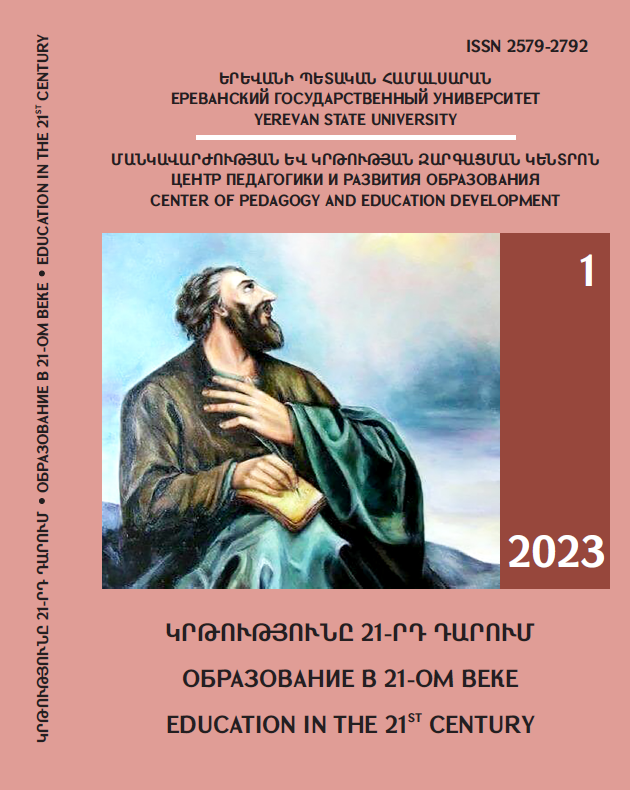ԿԱԶՄԱԿԵՐՊԱԿԱՆ ՄՇԱԿՈՒՅԹԸ ՀԱՄԱԼՍԱՐԱՆՆԵՐՈՒՄ. ՄԻՋԱԶԳԱՅԻՆ ՓՈՐՁԻ ՈՒՍՈՒՄՆԱՍԻՐՈՒԹՅՈՒՆ
DOI:
https://doi.org/10.46991/ai.2023.1.220Keywords:
Կազմակերպական մշակույթը բուհերում, կազմակերպական մշակույթի տեսակները, , կազմակերպական մշակույթը միջազգային բուհերումAbstract
Կազմակերպական մշակույթը բուհերի արդյունավետ գործունեության և բարենպաստ միջավայր ապահովող հիմնական նախադրյալներից է: Թեև կազմակերպական մշակույթը ոչ ֆորմալացված բնույթ ունի, սակայն վճռորոշ գործոն կարող է լինել կառավարչական որոշումների կայացման և գործընթացների որակի ապահովման համար: Հոդվածում ուսումնասիրվում են միջազգային համալսարաններում կազմակերպական մշակույթի չորս հիմնական տեսակները (ճկուն, խմբային, աստիճանակարգության և շուկայական մշակույթները): Համեմատելով և վերլուծելով մասնագիտական գրականությունը՝ ակնհայտ է դառնում, որ միջազգային բուհերում հիմնականում գերիշխում է ճկուն կազմակերպական մշակույթը։ Եթե անգամ որևէ համալսարանում կազմակերպական մշակույթի ինչ-որ տեսակ ավելի գերիշխող է, այդուհանդերձ, բուհերը սովորաբար ձգտում են ունենալ ճկուն կազմակերպական մշակույթ։ Ճկուն մշակույթը նպաստում է անձնակազմի անդամների միջև համախմբվածությանն ու կապվածությանը՝ նպաստելով նրանց՝ տվյալ կազմակերպությանը պատկանելու զգացումի և հանձնառության ամրապնդմանը: Ճկուն մշակույթում բոլոր դերակատարները համագործակցում են կազմակերպության բարելավման նպատակով, որն էլ առավել դյուրին է դարձնում համատեղ որոշումների կայացումը:
References
Aysun, C., Chang, Z. (2019). Organizational Culture Type in Turkish Universities using OCAI: Perceptions of Students, Journal of Education Culture and Society No. 2, pp. 270-292.
Berrio, A. A. (2003). An Organizational Culture Assessment Using the Competing Values Framework: A Profile of Ohio State University Extension, Journal of Extension, 41(2), pp. 3-10.
Bulach, C., Lunenburg, F. C., & Potter, L. (2012). Creating a Culture for High-performing Schools: A Comprehensive Approach to School Reform (2nd ed.). Lanham, M.: Rowman & Littlefield, 340 p.
Cameron, K. S. & Quinn, R. E. (2011). Diagnosing and Changing Organizational Culture: Based on the Competing Values Framework, John Wiley & Sons, 290 p.
Dębski, M., Cieciora, M., Pietrzak, P., Bołkunow, W. (2020). Organizational Culture in Public and Non-public Higher Education Institutions in Poland: A Study Based on Cameron and Quinn’s Model. Human Systems Management, 2020, 39, pp. 345-355.
Dedoussis, E. (2004). A Cross‐cultural Comparison of Organizational Culture: Evidence from Universities in the Arab World and Japan. Cross Cultural Management: An International Journal, 11(1), pp. 15-34.
Givens, R. J. (2012). “The Study of the Relationship between Organizational Culture and Organizational Performance in Non-Profit Religious Organizations,” International Journal of Organization Theory and Behavior, Vol. 15, No. 2, pp. 239-263.
Gorzelany, J., Gorzelany-Dziadkowiec, M., Luty, L., Firlej, K., Gaisch, M., Dudziak, O., Scott C. (2021). Finding Links between Organisation's Culture and Innovation. The Impact of Organisational Culture on University Innovativeness, https://journals.plos.org/plosone/
article?id=10.1371/journal.pone.0257962 (10.01.2023).
Hartnell, C. A., Ou, A. Y., and Kinicki, A. (2011). “Organizational Culture and Organizational Effectiveness: A Meta-analytic Investigation of the Competing Values Framework's Theoretical Suppositions,” Journal of Applied Psychology, vol. 96, No. 4, pp. 677-694.
Miguel, P. C. (2015). Receiving a National Quality Award Three Times: Recognition of 128 Excellence in Quality and Performance, the TQM Journal, vol. 27, pp. 63-78.
Muller, R. (2014). Convergence or Divergence among German and US Universities? A Case Study Analysis of Organizational Cultures Transmitted through Mission Statements. Paper presented in track 2 at the EAIR 36th Annual Forum in Essen, Germany.
Omerzel, R., Biloslavo, A., Trnavcevic, A. (2011). Knowledge Management and Organizational Culture in Higher Education Institutions, Journal of East European Management Studies, 16(2), pp. 111-139.
Qaiser, R. J., Aamer, H., Maliha, B. (2021). The Impact of Organizational Culture on Job Satisfaction in Universities of Pakistan: a Competing Values Framework Perspective, Pakistan Journal of Social Research, Vol.3, No. 3, September, pp. 340-351.
Downloads
Published
How to Cite
Issue
Section
License
Copyright (c) 2023 Makaryan Mariam

This work is licensed under a Creative Commons Attribution-NonCommercial 4.0 International License.

